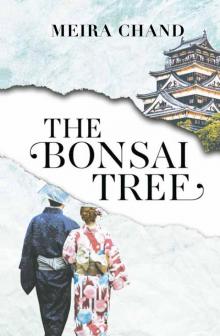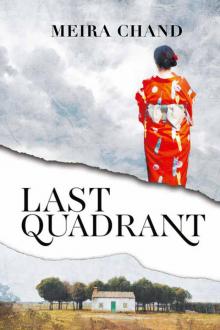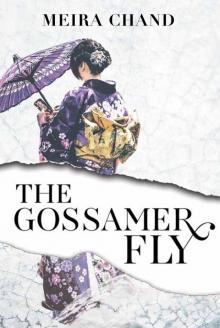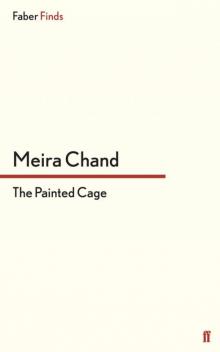- Home
- Meira Chand
Last Quadrant Page 5
Last Quadrant Read online
Page 5
Nobuo, Takeo and Jun pushed before her, vying for who should be last. Eiko Kubo stepped forward to sort them out. Takeo had a mother in a mental home and an alcoholic father, Jun had been abandoned in a park, and Nobuo, the biggest one, had found his debt-ridden father hanging from a rafter, after his mother left home. Under Eiko’s instruction they offered arms, took sweets and moved on. And soon it was finished, soon they were gone and the trail of feet and voices faded down the corridor. Usually at this time they would all be in school, but today was a holiday.
‘Did the new child arrive?’ Eva asked Sister Elaine, who waited behind in the surgery, after the children had gone. A boy of eleven, Kenichi, was to be added to the orphanage that morning.
‘Yes, a little monster. They brought him all the way from Osaka in the orphanage bus, because no one would take him on the train. I hope we won’t have trouble here.’ Sister Elaine tightened her mouth.
‘I expect we shall. We must prepare for it, and hope it won’t last long.’ Eva sorted through papers on her desk.
‘He is not the kind of child I find easy to handle. And my concern is for his effect on the others.’ Sister Elaine stood tall and thin, tight as a furled umbrella.
Eva looked up, her expression concerned. ‘You seem very tired and anxious. I did ask you some time before if you felt well. Maybe a tonic is needed.’ Eva had watched the woman in the six months she had been with the orphanage; the mission often sent one of their nuns to work at St. Christopher’s. Immediately Eva had noticed the tension in Sister Elaine, like a spring that wound her taut.
‘The Lord has been good enough to grant me fine health,’ Sister Elaine said tightly. ‘I am taking the older group of children for their apple picking. Am I to take that new child too?’ she demanded.
‘It would be an idea,’ Eva said evenly. ‘Be back by noon. Geraldine Cooper is coming to present a donation. She will want photographs with the children; she is bringing some newspaper people with her. The donation will buy us six new desks.’ Eva smiled, but the woman stood waiting to go.
Eva watched her shut the door, and shook her head silently. She turned back to the paperwork on her desk, but found herself abstracted. And soon she saw them going out together, Akiko and Daniel, pushing open before them the high iron gate. For a moment Akiko’s profile swung towards Eva, free of the dark fall of hair, then the gate shut upon them. From the distance that separates, even in love, Eva looked at the disappearing back of the child she called her own.
Her own. My own. Silently she had said the words to herself that first evening, looking at the child asleep in a box. An ugly stained cardboard box, with cheap red stencilled letters on its sides. No other child had come to her like that, on her doorstep, in a box. Outside the night had been closed and black, even though she had searched, calling to the dark. No voice answered, and the night had returned her to the child. And she saw that it was planned then. The box provided most things, two small jackets, a change of dress and underwear, some biscuit crumbs, a mouse made from a man’s grey sock, already darned and worn before it was stuffed and embellished with button eyes. And Kyo’s letter, crushed into a crumpled envelope that once held a gas bill, pinned to the child’s dress.
Akiko, Autumn’s child, an appropriate name, for her birthday was October, and the child was almost two. Eva had looked at the Japanese characters’ meaning: Autumn and child. Crystal clear and bright, she had seen her fate etched there before her. In the wide, round letters and misspelt English words of Kyo’s letter there was no place for emotion. Kyo’s stunted English spelt out only facts. From the bar where she worked near the military base she had struck up a relationship with an American serviceman. Akiko was his child, but the man left her before the child was born, returning without a word to the United States. One day he was there, the next he was gone, with neither warning nor contact address. At the base they would give her no information, and told her brusquely to get rid of the child, but it was too late. After Akiko’s birth Kyo had tried to support the child, which had been hard. Now there was an opportunity for her, they wanted some Japanese girls in Bangkok, for a new cabaret opening there. Kyo was going. The child, Akiko, she would leave with Eva. She alone, Kyo knew, would care. She could do with the child what she wished, what she thought best. Put her up for adoption, Kyo said.
In the box the child had stirred, wedged uncomfortably against the sides. And Eva knew then, however hard she tried to find her, there would be no trace of the woman, Kyo. She had chosen to walk away. And there has been, of course, no contact until today.
9
Daniel focused his camera on the heavy roof behind the trees, and then followed Akiko. After a narrow approach, between scraggy pines and rickety houses they reached stone lions that guarded the shrine. The doors of a storehouse were open beyond. Pulled out from within was a festival float, like a ship in dry dock, surmounted by a huge drum. Two men in short happi coats, beat the vertical drum from either side, attacking rhythmically. Tendons stood out like oiled rope on their bare legs. Daniel took a photograph and allowed Akiko to lead him deeper into the crowd. Women and small children jostled about him, women with baskets of shopping and aprons still on. The drum pounded in his head.
‘Each local shrine has its festivals,’ Akiko said, the throb warming her face. Sun beat hard and flat on her hair, until it seemed fluid. He watched her denim skirt threading deeper into the crowd.
Sometimes now the sun went in and the shadows of clouds fell over the shrine. But the heat remained and the gnats droned on in a soft grey cloud beneath a pine. There was the close human smell of bodies, and the sudden odour of a woman’s hair lacquer, or leeks in a basket of shopping. Japanese folk music blared from the mouth of a megaphone, attached to the branches of a tree. Strung above Daniel’s head paper lanterns swung pink and white and red, their fragile globes crinkled like old women’s faces. A child, its nose half buried in candy floss, bumped into his knees. He bent to steady the child, and the small boy’s eyes met his own for a moment, widening in fear before he ran off. Daniel felt his own difference then, in the curious glances around him, although the mother of the child smiled a shy apology for the sticky stain upon his trousers.
They broke free of the crowd and came to an open area before a square makeshift dais at the centre of the courtyard with a canopy of red and white cloth. It resembled a gayly iced cake in the shrine yard. A group of matronly women danced upon it in a sedate ring, their hands moved smoothly, weaving patterns in the air. They wore identical yukata with a wave design at the sleeve and hem, red obi were folded on their backs.
‘They’re local women, come to dance today,’ Akiko told him. Her eyes were thoughtful, her face a smooth pebble turned in upon itself. He saw isolation fitted her closely, like an armour, and wished he could find a way to her. She shaded her eyes against a blaze of sun released abruptly from a cloud. Her nails were small and perfect, on her neck was a soft brown mole.
‘I haven’t had candy floss since I was a child,’ Daniel said seeing the stall after they left the dancing. She shook her head when he offered her some. He walked forward to where a crowd of children stood. A coarse-featured fellow in a grey peaked cap stooped before a tub, a circle of clear plastic was pegged in a curtain above the cauldron. Against its transparent sides Daniel watched stray strands of sugar harden and crack, in a delicate web. In the depths of the cauldron the man twirled a stick, collecting a soft cocoon. The children pushed their money forward and darted away.
Daniel stood, looking down into the whirling pot at the sugar, spinning and spinning its endless web. The gyration closed in on him, spiralling up. And he was back for a moment again within the cramped confines of his mind, so that he stared at the great muff of candy floss the man placed in his hand, wondering why he had bought it. He held it on his tongue and it melted gritty and sweet in his mouth.
‘Have some,’ he said, holding out the candy floss. ‘There is so much. You bite from that side, I’ll bite from this.’
At first she shook her head, but he insisted. She pushed her face forward reluctantly, reaching out with her mouth for the soft sugar. He watched it lie like gauze on her lip, until she licked it off.
‘You’ve got some on your cheek, come here.’ Carefully, he picked off the strand. She stood still, but lowered her eyes when he touched her. He could think of nothing to say.
‘What’s that?’ He pointed to the water, to break the moment, too sudden to accept or understand. She looked up slowly then, and they turned towards the tank, hollowed out of one great stone. An ornate metal dragon curled sinuously upon one side, water flowed from its mouth into the tank. Long-handled bamboo drinking cups sat neatly, face down on the rim before it.
‘It’s water for purification. Here, dragons are harmless water spirits. Long ago they were often painted on ceilings as a protection against fire,’ Akiko said beside him.
Sun struck the surface of the water; the tank brimmed and overflowed. Looking down he saw himself stare up out of the brown silk stone of the bottom. Beside him in the water the girl quivered and changed and found shape again, defying substance. Between them reflected the snowy mound of floss; behind, sun edged the rim of a cloud.
The pounding of the drum pulsed through Daniel’s head. The shuffle of feet on the stage vibrated through the sound system beneath the beat of the drum, but the voices of the dancers were clear and high at the chant of the chorus. ‘A yoi yoi yoi’, like the plaintive cry of a lonely bird. And for a moment there was Casey again, there was the river with its still, rich smell, closed and smooth, reflecting only the unperturbed sky, hiding in its belly Casey and the car. He shook himself free of the picture.
They found a seat against the pine and Akiko sat beside him. Beyond the jagged shapes of trees the sky was open and white and endless, the banks of cloud towering up like staircases. He wondered why he must feel so shut into the past, with his nightmares and his memories and wondered if it would ever end. He was conscious of the girl beside him.
‘You must tell me about America. I know very little, but it was my father’s country. I am always curious. All my life I have been trying to find him, in one abstract way or another. I should not, I know it is useless,’ Akiko said. The words barely rose above her.
He saw then she hid a scar like him, one she could never forget. He saw she spoke with difficulty, as if each word shattered a secret life. Already he could tell she regretted having spoken, for her lips pressed hard upon each other. He knew how she felt, he wished he could tell her that he, like her, was separated for ever from other people, by something others could not grasp. But he could do no more than offer the candy floss.
‘That accident. I killed two people, a man and a child.’ It came out of him whole, like a stone. Casey’s face came before him again, dripping still, a slimy weed entwined in his hair.
She shook her head, worried. ‘No, it was an accident. Eva told me. An accident.’
But he did not want those feeble words again, divorcing him from himself, so that he existed free of his deed to other people.
‘No. I killed them. I know it. I did.’ He wanted to tell her, wanted her to know.
She did not speak then, beside him on the bench.
‘You are the first person to whom I have said that.’ For until now he had let them say all they wished.
Under the noise and the music there was a stillness now between them, a stillness he could almost touch. And he knew that in some soundless way the girl had entered and was there with him, in the stark, painful world of his thoughts.
10
‘She has come. Mrs Cooper has come,’ they informed Eva. She put down her pen on a list of accounts. The woman had come at the same time as the children, trooping back from the orchard. Eva walked resignedly to the visitor’s parlour.
‘Eva, my dear. Isn’t this marvellous?’ Geraldine Cooper engulfed Eva in an embrace.
‘There will be more. Oh, much more. We have already started on the Christmas collection. I can safely say you may expect another donation in December.’ For at intervals Geraldine Cooper rolled in upon the orphanage, a string of committees clattering in her wake.
‘For what other reason are we here, if it is not to help those less fortunate than ourselves. I consider it my duty, the very least I can do. Now, I want that all down, I don’t mind being candid.’ Geraldine Cooper turned to a frail, young Japanese man with a notepad hovering behind. She sank into a cane armchair and accepted gratefully the glass of lemonade Yoshiko Mori offered on a lacquer tray. About her the basketwork creaked.
‘I want the first photograph to be you and me, Eva. Don’t you think so, my dear? In these two cane chairs, with the cheque nice and crisp between us, just here. And then some more with the children and Sister Elaine. Perhaps we can mention all that marvellous fruit they just picked, the dears.’ Geraldine motioned Eva into the chair, and rummaged in her handbag for the cheque. It was a large, soft-bellied bag with an opulent clasp, aptly reflective of Geraldine Cooper. She fished out scissors, a screwdriver, a compact and two postcards before retrieving the cheque. She waved it aloft, her plump face pink, like an ancient baby.
‘From over there I think, from the left.’ Geraldine waved the photographer into position with the red-talon of a fingernail. ‘On my right of course I still have that nasty old scar where I fell against the roses around our front door.’ In a mirror Geraldine snatched an anxious glance at her face, upon which time would soon wage its final assault. Then the flash bulb popped, and Eva blinked.
‘It’s all so kind, so kind,’ she murmured, as the bulb flared again. Beside her Geraldine Cooper smiled fixedly through a stiff hedgerow of eyelashes, heavy with mascara.
‘Nonsense my dear. My duty. And you know what a tender spot I have for you. An old softie, that’s me.’ Geraldine Cooper rapped Eva’s knuckles playfully. ‘Now off we go. A change of scene.’ The chair creaked ominously as Geraldine rose, but she took little notice. She was used to such deferential murmurings, such justifications of her weight.
Why do I always allow this takeover, thought Eva. For a moment Geraldine appeared to resemble an inflated crepe paper rose or a broken shutter flapping in the wind. Eva sighed and smiled, resigned herself and followed. She could not dislike the woman, she was not given to that emotion, and Geraldine’s kindness was always overwhelming. They reached the dining room door.
‘Ah. The darlings. The dear ones. Here we are,’ Geraldine threw open her arms, plunged into the room and moored herself amongst the apprehensive orphans, about to sit down to lunch.
She made first for the tables where the little ones sat. She condensed herself onto a small wooden chair, her hips overflowing its childish proportions. Reaching out she pulled the blind one, Ruriko, to her. Geraldine’s flesh swelled and pressed about the child and Ruriko pulled back, her nose twitching as she breathed in the expensive scent of fern and musk. She put up a hand and touched a cheek. A soft touch within which Geraldine Cooper remembered and dissolved.
‘The little blind one. Mariko. Of course.’
‘Ruriko.’ The child smiled.
‘The darling. Of course.’ Geraldine Cooper pulled the child onto her lap, pressing cheeks together, melting bones, gesturing to the other children. They held back, uncertain, until Sister Elaine gathered and grouped them about Geraldine. They blinked and one cried when the flash bulb popped. Undeterred, Geraldine Cooper unfolded herself from Ruriko’s chair, and examined at the end of the tables the gleaming apples, washed and piled into blue plastic baskets. She turned one against the light in her hand, sniffing its fragrance. The camera flashed again.
Eva could see the pictures already, distorted and distant, awash in a sea of alien newsprint out of which only Geraldine Cooper’s strength of will would survive. Still, she kept prominent the thought of the desks they would receive, as a result of Geraldine’s cheque. She noticed the new child then, Kenichi, sullen before his food. He did not raise his eyes, he did not smile with the oth
ers, who were shyly attentive to Geraldine Cooper’s small cries. He looked down at a dish of shredded radish and one sour pickled plum, shuttered within himself.
Such contempt was a challenge to Geraldine Cooper. She made straight for the child, hovering above him like a strange plumed bird. She cooed and dipped and muzzled his crew cut head. The soft stubble of his hair parted beneath her chin. But stiff as a biscuit, he gazed at the buzzing of a grounded fly. He ignored Geraldine Cooper’s administrations. The other children watched and waited, the moment stretched and snapped.
There was the quiver and fall of the chair, and the cry, wrenched from deep in the child and thrown up, all splinter and rag. Eva saw destitution then in his face, like an ugly bruise beneath the skin. He picked up the plate of radish pickle and sesame seeds, and threw it at Geraldine Cooper.
It splattered one ample breast and hung in limp yellow strands from the collar of her dress. The burnt black specks of sesame seeds were like ants upon her neck. Geraldine Cooper’s face became that of an old and crushed pink doll. She trembled, she wobbled and sat down on a chair. Eiko Kubo sprang forward with a wet cloth and Yoshiko Mori rushed after the child. Eva herself picked the sesame seeds from Geraldine Cooper’s neck, under her fingers the skin was soft as old kid gloves. The full crease of Geraldine’s décolletage imprisoned a radish shred. It came away warm between Eva’s fingers.
‘It’s our new one,’ Eva apologised. ‘He just arrived this morning. He is difficult, disturbed, they warned me about him. But I am so sorry for this.’
Geraldine Cooper gallantly reassembled herself, dabbing a handkerchief to her neck.
‘Don’t worry. I understand. It’s all part of your wonderful work, my dear. I hold myself ready in life for most things, and the dress was due for the wash. Anyway, we were all finished, I think.’ Geraldine nodded to the reporter and bit at a sesame seed on her lip. ‘Fortunately, I like the taste of these things.’ The seeds broke crisply between her teeth.

 The Bonsai Tree
The Bonsai Tree A Choice of Evils
A Choice of Evils Last Quadrant
Last Quadrant Sacred Waters
Sacred Waters The Gossamer Fly
The Gossamer Fly The Painted Cage
The Painted Cage House of the Sun
House of the Sun